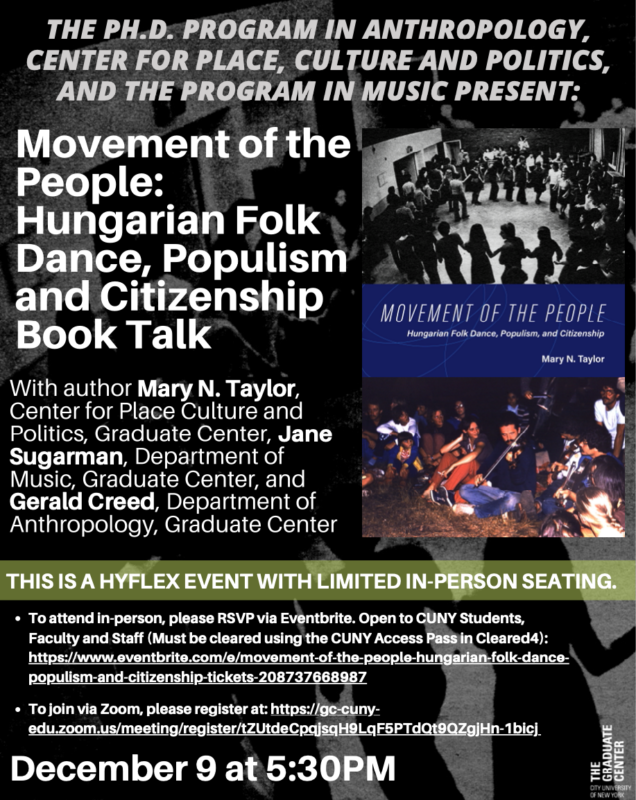With author Mary N. Taylor (Center for Place Culture and Politics, CUNY Graduate Center), Jane Sugarman (Department of Music, CUNY Graduate Center), and Gerald Creed (Department of Anthropology, CUNY Graduate Center)
Dec. 9 at 5:30PM EST at the Graduate Center
Register via Zoom
This is a Hyflex event with limited in-person seating in the Brockway room #6402, Department of Anthropology at the Graduate Center. To attend in-person, please RSVP via Eventbrite.
Movement of the People: Hungarian Folk Dance, Populism and Citizenship
Since 1990, thousands of Hungarians have vacationed at summer camps devoted to Hungarian folk dance in the Transylvanian villages of neighboring Romania. This folk tourism and connected everyday practices of folk dance revival take place against the backdrop of an increasingly nationalist political environment in Hungary.
In Movement of the People, Mary N. Taylor takes readers inside the folk revival movement known as dancehouse (táncház) that sustains myriad events where folk dance is central and championed by international enthusiasts and UNESCO. Contextualizing táncház in a deeper history of populism and nation making, Taylor examines the movement’s emergence in 1970s socialist institutions, its transformation through the postsocialist period, and its recent recognition by UNESCO as a best practice of heritage preservation.
Approaching the populist and popular practices of folk revival as a form of national cultivation, Movement of the People investigates the role of folk-dance revival in the cultivation of political personhood and construction of the ‘folk,’ ‘ethnonation,’ and ‘national affect’ across tumultuous rounds of incorporation of the Hungarian state into the world capitalist system. It gives insight into the cultivation of ethnonational sentiment under conditions of (neo)liberal governance, as well as nuances in understandings of ‘the people’ that are silenced by liberal antipopulism.
Mary N. Taylor is the Assistant Director of the Center for Place, Culture, and Politics at the Graduate Center of the City University of New York. Working at the intersection of anthropology, urbanism, and dialogical art, her praxis investigates sites, techniques, and politics of civic cultivation and the production of political personhood, the ethics and aesthetics of nationalism/cultural differentiation, and the history of communist experiment.
Her work has appeared in numerous journals. She co-edited Co-revolutionary Praxis: Accompaniment as a Strategy for Working Together (Aukland: St. Paul St. Gallery, 2015), and her historical ethnography Movement of the People: Folk Dance, Populism, and Citizenship in Hungary was published in 2021 (Indiana University Press). She has taught at Hunter College, the Cooper Union for the Advancement of Science and Art, and the Parsons School of Design. She is on the editorial collective of LeftEast.
Gerald Creed is Professor of Anthropology at Hunter College and the CUNY Graduate Center. A specialist on agrarian political economy, ritual, and identity in Eastern Europe, he has conducted intermittent fieldwork in Bulgaria since 1987. His publications include Domesticating Revolution: From Socialist Reform to Ambivalent Transition in a Bulgarian Village (1998, Penn State University Press) and Masquerade and Postsocialism: Ritual and Cultural Dispossession in Bulgaria (2011, Indiana University Press).
Jane C. Sugarman is Professor of Music at the Graduate Center [of the City University of New York] and director (DEO) of the program in ethnomusicology. She is the author of Engendering Song: Singing and Subjectivity at Prespa Albanian Weddings (Univ. of Chicago Press, 1997), as well as numerous articles on music and dance in and from southeastern Europe as they relate to gender and sexuality, class, nation, diaspora, and states of conflict. She is currently completing a book on Kosovo Albanian musical production in the socialist and post-socialist periods as it relates to the marginalized status of Albanians within a succession of political entities.
This event is sponsored by the Department of Anthropology and coponsored by the Center for Place, Culture, and Politics and the Department of Music. It is free and open to the public.




